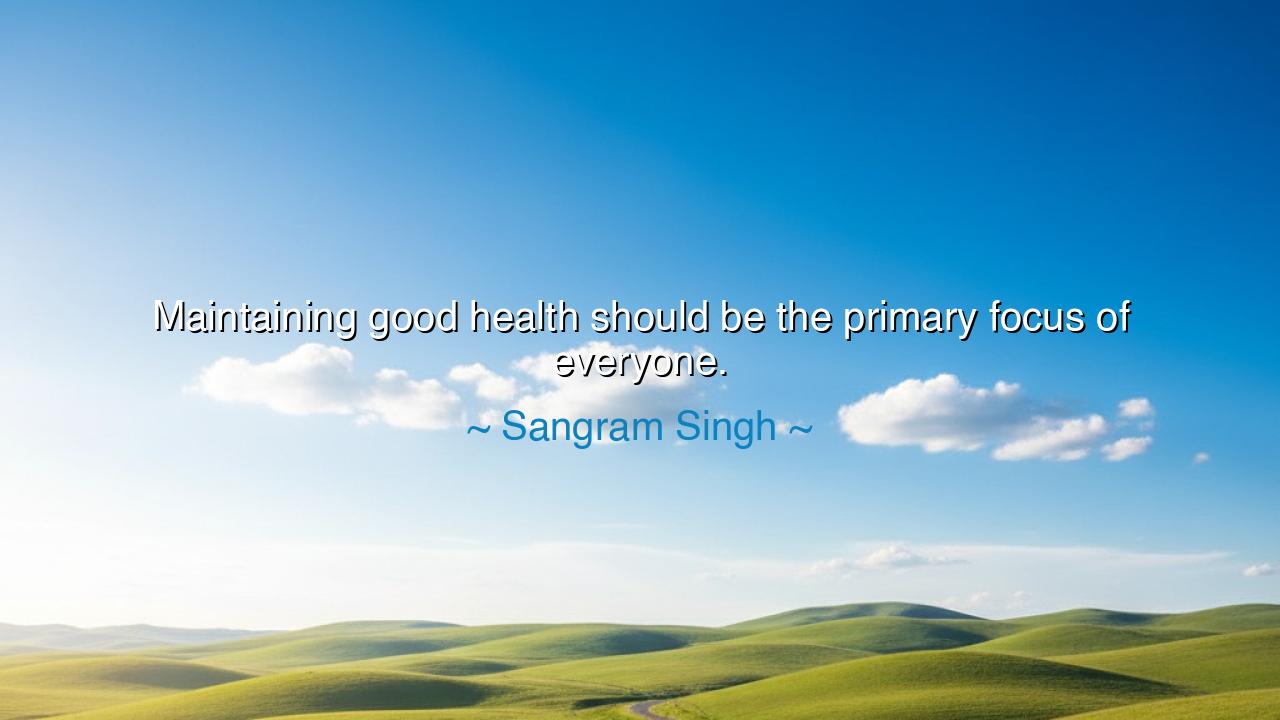
Maintaining good health should be the primary focus of everyone.






Hearken, O children of generations yet unborn, and attend to the words of Sangram Singh, who spoke with clarity and conviction: “Maintaining good health should be the primary focus of everyone.” In these words lies a truth as ancient as the sages themselves: that the body is the vessel of the mind, the instrument of action, and the foundation upon which all human endeavors are built. Without health, ambition falters, courage wanes, and the joys of life are dimmed.
Consider first the primacy of good health. The ancients taught that balance and moderation were the path to strength. Hippocrates, the father of medicine, declared that food, exercise, and rest must be in harmony to preserve life and vitality. Sangram Singh echoes this wisdom, reminding us that health is not merely the absence of disease, but a cultivated state of balance, endurance, and resilience that empowers the soul to act and create.
The words also reflect the universal nature of this pursuit. Health is not reserved for warriors, rulers, or sages alone—it is the inheritance and responsibility of every human being. Consider the story of Miyamoto Musashi, the legendary samurai, who honed both mind and body through relentless discipline. His mastery in combat arose not solely from skill with the sword, but from the careful maintenance of his strength, agility, and endurance, proving that vigilance over one’s health is inseparable from the capacity to achieve greatness.
Singh’s reflection reminds us that neglect of health bears consequences beyond the personal. Societies flourish when their members are strong, alert, and resilient; they falter when illness, fatigue, and imbalance dominate. Ancient civilizations, from the armies of Rome to the dynasties of China, recognized that physical well-being was the cornerstone of productivity, courage, and innovation. The wisdom of the ages affirms: without health, all other pursuits are imperiled.
Furthermore, maintaining health requires both awareness and action. It is not enough to desire vigor; one must cultivate it through proper nourishment, regular exercise, sufficient rest, and attention to mental and emotional well-being. Consider the life of the philosopher Seneca, who emphasized moderation, reflection, and care of the body to sustain the mind in times of stress. Health is a dynamic pursuit, demanding vigilance, discipline, and humility before the limits of the flesh.
From this emerges a lesson timeless and practical: prioritize your health as the foundation of every ambition. Wealth, knowledge, and power are hollow if the vessel that carries them is weakened. Singh’s words remind us that to honor the self, and to serve others, we must first ensure that our own body and mind are fortified, balanced, and resilient.
Practical action flows naturally from this wisdom. Engage in daily practices that nourish both body and spirit: exercise, mindful eating, meditation, and sufficient rest. Attend to mental health with the same diligence as physical health. Encourage those around you to do the same, creating communities where vitality, resilience, and well-being are shared and celebrated. Health is the first investment that yields returns in every domain of life.
Finally, remember the eternal truth: the human journey is empowered, prolonged, and enriched when the vessel of the self is cared for with diligence and respect. Sangram Singh’s words are a clarion call: cherish, protect, and cultivate your health, for it is the foundation upon which courage, wisdom, and joy are built, and through it, your legacy endures.
If you wish, I can also craft a narration-ready version of this reflection, with rhythmic rises and falls that highlight the heroic and instructive cadence of Singh’s insight.






AAdministratorAdministrator
Welcome, honored guests. Please leave a comment, we will respond soon